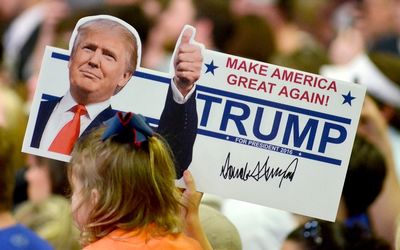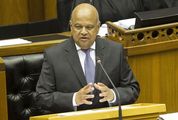HE HAS been called a phoney, a fraud and a threat to democracy — and that is just by members of his own party. Other critics have compared Donald Trump to Hitler and Mussolini. I have shared in the horror at Trump’s rise, but at the same time, a small voice in the back of my head has asked: "Is he really that bad? Might all this hysteria be a bit overdone?"
The death of Nancy Reagan at the weekend served as a reminder of the condemnation that once greeted the rise of her husband, Ronald Reagan. Like Trump, Reagan was labelled a fascist, accused of race-baiting, and derided as a moron. As a student when Reagan took office, I remember the widespread predictions that he would provoke a world war. And yet, Reagan is now securely in the pantheon of "great presidents".
It is certainly possible to construct a case in Trump’s defence. If you move beyond the vulgarity of his style and examine his proposed policies, it is clear that on many domestic and foreign policy issues, he is more moderate than several of his "establishment" rivals for the Republican nomination.
Trump has argued for closing tax loopholes for high finance and has said the state should guarantee health-care coverage for all Americans. He has also defended Planned Parenthood, a family planning group, savaged regularly by the evangelical right.
When it comes to foreign policy, Trump’s rhetoric is aggressive and nationalistic, but his positions on specific issues suggest an Obama-like caution about US military intervention and democracy promotion overseas.
Trump’s rivals are running attack ads against him for having the temerity to suggest, correctly, that it might not be a good idea to scrap the Iran nuclear deal. Also, in the last television debate, it was not Trump but the "mainstream" Republicans, John Kasich and Marco Rubio, who advocated the reckless option of sending US troops into Libya.
The most controversial Trump positions are his call for "the wall" along the Mexican frontier, and a temporary ban on Muslims entering the US. Both policies have been phrased in provocative terms. But a demand for the enforcement of US border controls and for zero tolerance of illegal immigration is ultimately an argument for the enforcement of existing US law, which should not be an intrinsically outrageous idea.
The appeal for a ban on Muslims entering the US was also immediately followed by the phrase, "until we’ve figured out what the hell is going on" — which is sufficiently vague to allow plenty of room to renege. A large part of the horror at the Trump phenomenon is that he is appealing to "nasty" instincts among the US electorate.
It is, however, the job of politicians to identify the concerns of voters and to frame a response. Trump has revealed an acute and unorthodox political intelligence that has repeatedly left his rivals and the media flat-footed.
So, that is the case for Trump’s defence. Do I buy it? Not really, I am afraid. The Trump phenomenon is as much about a political style as about policies, and Trump’s style is abhorrent.
Mitt Romney, the Republicans’ candidate in 2012, summed up Trump’s personal style well when he decried "the bullying, the greed, the showing off, the misogyny, the absurd third-grade theatrics". It is frightening to think that a man with this little self-control could be in charge of the world’s largest nuclear arsenal.
Finally, he has also embraced trade protectionism and is highly sceptical about the US’s alliance commitments overseas. Those policies, if they are pursued energetically, would represent a full-scale retreat from US global leadership, which would probably make the world a much more dangerous place.
Of course, it is very hard to know how much of what he says is for real and how much is posturing for the voters and the cameras.
Trump’s record as a businessman and some of his writing suggest that he is, above all, a pragmatic deal maker who likes to make radical demands as an opening position, before finding a compromise. It is certainly possible that a President Trump would surprise his critics and govern responsibly. I sincerely hope that I never get to find out.
© The Financial Times Limited 2016

Donald Trump rally. Picture: REUTERS/RICK GUY
HE HAS been called a phoney, a fraud and a threat to democracy — and that is just by members of his own party. Other critics have compared Donald Trump to Hitler and Mussolini. I have shared in the horror at Trump’s rise, but at the same time, a small voice in the back of my head has asked: "Is he really that bad? Might all this hysteria be a bit overdone?"
The death of Nancy Reagan at the weekend served as a reminder of the condemnation that once greeted the rise of her husband, Ronald Reagan. Like Trump, Reagan was labelled a fascist, accused of race-baiting, and derided as a moron. As a student when Reagan took office, I remember the widespread predictions that he would provoke a world war. And yet, Reagan is now securely in the pantheon of "great presidents".
It is certainly possible to construct a case in Trump’s defence. If you move beyond the vulgarity of his style and examine his proposed policies, it is clear that on many domestic and foreign policy issues, he is more moderate than several of his "establishment" rivals for the Republican nomination.
Trump has argued for closing tax loopholes for high finance and has said the state should guarantee health-care coverage for all Americans. He has also defended Planned Parenthood, a family planning group, savaged regularly by the evangelical right.
When it comes to foreign policy, Trump’s rhetoric is aggressive and nationalistic, but his positions on specific issues suggest an Obama-like caution about US military intervention and democracy promotion overseas.
Trump’s rivals are running attack ads against him for having the temerity to suggest, correctly, that it might not be a good idea to scrap the Iran nuclear deal. Also, in the last television debate, it was not Trump but the "mainstream" Republicans, John Kasich and Marco Rubio, who advocated the reckless option of sending US troops into Libya.
The most controversial Trump positions are his call for "the wall" along the Mexican frontier, and a temporary ban on Muslims entering the US. Both policies have been phrased in provocative terms. But a demand for the enforcement of US border controls and for zero tolerance of illegal immigration is ultimately an argument for the enforcement of existing US law, which should not be an intrinsically outrageous idea.
The appeal for a ban on Muslims entering the US was also immediately followed by the phrase, "until we’ve figured out what the hell is going on" — which is sufficiently vague to allow plenty of room to renege. A large part of the horror at the Trump phenomenon is that he is appealing to "nasty" instincts among the US electorate.
It is, however, the job of politicians to identify the concerns of voters and to frame a response. Trump has revealed an acute and unorthodox political intelligence that has repeatedly left his rivals and the media flat-footed.
So, that is the case for Trump’s defence. Do I buy it? Not really, I am afraid. The Trump phenomenon is as much about a political style as about policies, and Trump’s style is abhorrent.
Mitt Romney, the Republicans’ candidate in 2012, summed up Trump’s personal style well when he decried "the bullying, the greed, the showing off, the misogyny, the absurd third-grade theatrics". It is frightening to think that a man with this little self-control could be in charge of the world’s largest nuclear arsenal.
Finally, he has also embraced trade protectionism and is highly sceptical about the US’s alliance commitments overseas. Those policies, if they are pursued energetically, would represent a full-scale retreat from US global leadership, which would probably make the world a much more dangerous place.
Of course, it is very hard to know how much of what he says is for real and how much is posturing for the voters and the cameras.
Trump’s record as a businessman and some of his writing suggest that he is, above all, a pragmatic deal maker who likes to make radical demands as an opening position, before finding a compromise. It is certainly possible that a President Trump would surprise his critics and govern responsibly. I sincerely hope that I never get to find out.
© The Financial Times Limited 2016

























Change: 1.41%
Change: 1.74%
Change: 1.55%
Change: 1.65%
Change: 1.42%
Data supplied by Profile Data
Change: 0.57%
Change: 0.09%
Change: 1.41%
Change: 0.00%
Change: -0.13%
Data supplied by Profile Data
Change: 0.06%
Change: -0.10%
Change: 0.12%
Change: 0.29%
Change: -0.12%
Data supplied by Profile Data
Change: -0.49%
Change: -0.31%
Change: -0.72%
Change: -0.35%
Change: -1.08%
Data supplied by Profile Data